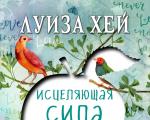Atom Energy Information Center. Nuclear Energy Information Centers
The Atomic Energy Information Center of St. Petersburg opened on the basis of the St. Petersburg State Technological Institute on April 20, 2011. The center conducts educational activities in the field of nuclear technology, and also popularizes the exact and natural sciences.
Visitors to the center can watch interactive multimedia programs on astronomy, the history of St. Petersburg, the development of nuclear energy and radioactive waste management. On the basis of ICAE, seminars and meetings with famous scientists, thematic meetings for teachers, schoolchildren and students are held. Excursions to industry enterprises are organized, lectures and seminars are held on important areas of scientific activity.
The Nuclear Energy Information Center combines features characteristic of modern 3D computer games - full interactivity of all participants, real-time simulation of processes.

A modern cinema hall with a panoramic screen, a stereoscopic projection system, stereo sound and various special effects. Personal monitors and interactive consoles help to receive and consolidate information in the form of an exciting game. Interactive games and quizzes are included in every program. All this creates an unforgettable feeling of immersion in the exciting world of virtual reality.
The staff of the St. Petersburg Atomic Energy Information Center was awarded many awards and thanks from partners of the departments of the St. Petersburg city administration.

Interactive sessions are held in the Information Center at the request of a group or institution. The maximum number of visitors in a group is 36 people. All sessions and events are free.
Operating mode:
- Monday - Friday from 9:00 to 18:00.
Saturday and Sunday are days off.
Nuclear Energy Information Centers (AEC) are multifunctional information and educational platforms that are created under the auspices of the Rosatom State Corporation in regions where nuclear industry facilities are being built or are already operating. Their task is to educate in the field of nuclear technology, inform about the activities of nuclear industry enterprises, popularize science and innovation, technical education among schoolchildren, their parents, students and teachers. The activities of the centers also include cooperation with the professional community in the field of popularization of science, holding popular science events in a variety of formats (popular science lectures by leading scientists, master classes of scientific journalists, championships in intellectual games, classes in technical creativity, experimental laboratories, scientific talk shows, science festivals, science films, etc.). More than 4,000 thematic projects are implemented annually.
Most centers are equipped with a modern video room, which combines panoramic 3D projection, computer graphics and animation, stereo sound, interactive consoles and personal monitors. Thanks to this, the effect of “immersing” the viewer into virtual reality is created. At any ICAE you can watch multimedia 3D programs that clearly tell you about the nuclear industry, its safety and economic efficiency in comparison with other types of electricity production. All programs include several quiz blocks, which allows visitors to absorb information in an easy playful way. Additionally, the centers distribute thematic booklets, educational literature and souvenirs.
Today, ICAE successfully operates in 17 cities of Russia, as well as in Astana (Kazakhstan), Dhaka (Bangladesh), Mersin (Turkey), Minsk (Belarus) and Hanoi (Vietnam). For example, in Murmansk the information center operates on the basis of the nuclear icebreaker Lenin. The operator of the network of information centers is the ANO “Information Center of the Nuclear Industry” (ICAO).
The status of information centers as iconic sites on the educational map of the country is confirmed by an impressive list of partners, including the Ministry of Education of the Russian Federation, the Ministry of Sports of the Russian Federation, the Polytechnic Museum, the Copernicus Science Center, Roscosmos, Rusnano, OJSC VimpelCom and others. The success of the project is also evidenced by international awards: in 2010, the project to create a network of nuclear energy information centers received the European Nuclear Society's PIME (Public Information Materials Exchange) award as the best communication project in the nuclear industry - PIME Award for Communications Excellence.
All sessions and events of the centers are free for visitors. Since November 2008, the centers have been visited by more than 2.7 million people, most of whom are schoolchildren, students and teachers. A complete list of information centers in Russia and abroad can be viewed



